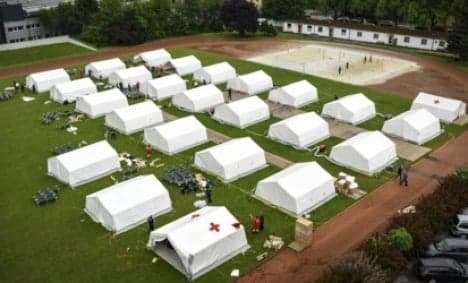500 refugees relocated to Slovakia

Around 500 asylum-seekers will be temporarily relocated from Austria to Slovakia following an agreement signed by the two nations on Tuesday to help ease the pressure on Vienna.
Austria, a country of 8.5 million people, received more than 28,000 asylum requests in 2014, three times the European average relative to population size.
It expects at least 75,000 to arrive by the end of this year.
Interior Minister Johanna Mikl-Leitner said the deal with Slovakia would help relieve the burden on Austria’s stretched capacities. "It's a great signal of solidarity," she noted.
Her Slovakian counterpart, Robert Kalinak, said Austria had often helped his country in the past by, for example, supporting its accession to the Schengen zone and European Union. "We want to repay our debts," Kalinak added.
The refugees will be transferred to a university camp in the western town of Gabcikovo between August and September.
As part of the two-year accord, Slovakia will cover the costs for their accommodation, food and general care, while Austria will provide security personnel at the campus. Asylum requests will also continue to be processed in Austria.
On Monday, Austria refused to take on further refugees under the EU's controversial quota plan to distribute 40,000 migrants evenly across the 28-country bloc.
Mikl-Leitner said Austria was processing as many asylum applications as Greece and Italy combined, with more than 8,000 demands expected for July alone - nearly half of which are from Syrians and Afghans.
Reception centres are overflowing, and some hostels for asylum seekers have been accused of providing inadequate care.
After completing the initial application steps at a federally run reception centre, asylum seekers are supposed to be moved to privately run housing in one of Austria's nine provinces.
But a lack of housing in the provinces means that many are forced to spend months in the crowded centres.
Comments
See Also
Austria, a country of 8.5 million people, received more than 28,000 asylum requests in 2014, three times the European average relative to population size.
It expects at least 75,000 to arrive by the end of this year.
Interior Minister Johanna Mikl-Leitner said the deal with Slovakia would help relieve the burden on Austria’s stretched capacities. "It's a great signal of solidarity," she noted.
Her Slovakian counterpart, Robert Kalinak, said Austria had often helped his country in the past by, for example, supporting its accession to the Schengen zone and European Union. "We want to repay our debts," Kalinak added.
The refugees will be transferred to a university camp in the western town of Gabcikovo between August and September.
As part of the two-year accord, Slovakia will cover the costs for their accommodation, food and general care, while Austria will provide security personnel at the campus. Asylum requests will also continue to be processed in Austria.
On Monday, Austria refused to take on further refugees under the EU's controversial quota plan to distribute 40,000 migrants evenly across the 28-country bloc.
Mikl-Leitner said Austria was processing as many asylum applications as Greece and Italy combined, with more than 8,000 demands expected for July alone - nearly half of which are from Syrians and Afghans.
Reception centres are overflowing, and some hostels for asylum seekers have been accused of providing inadequate care.
After completing the initial application steps at a federally run reception centre, asylum seekers are supposed to be moved to privately run housing in one of Austria's nine provinces.
But a lack of housing in the provinces means that many are forced to spend months in the crowded centres.
Join the conversation in our comments section below. Share your own views and experience and if you have a question or suggestion for our journalists then email us at [email protected].
Please keep comments civil, constructive and on topic – and make sure to read our terms of use before getting involved.
Please log in here to leave a comment.